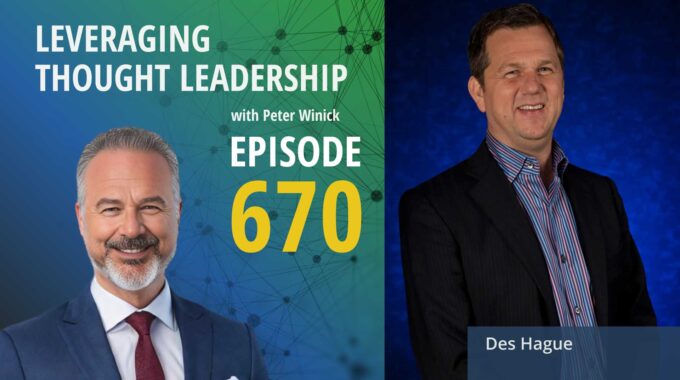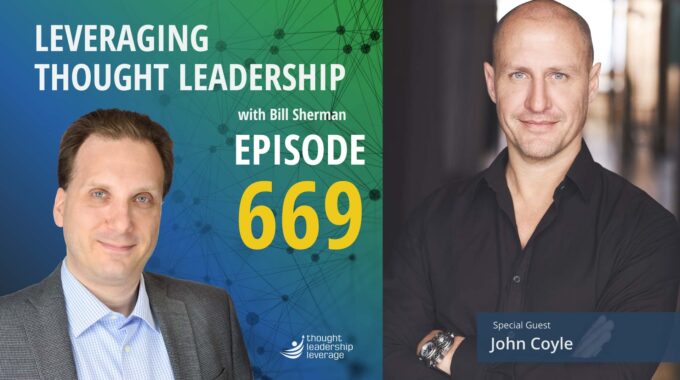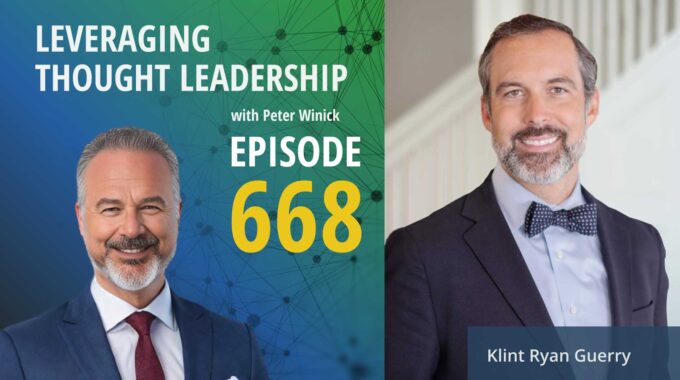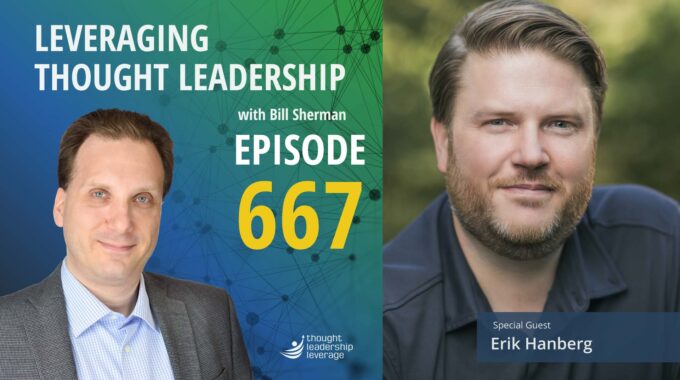Lessons in resilience, growth, and accountability from a global CEO This episode explores why thought…
Thought Leaders Speaking for Visibility | Steve Markman
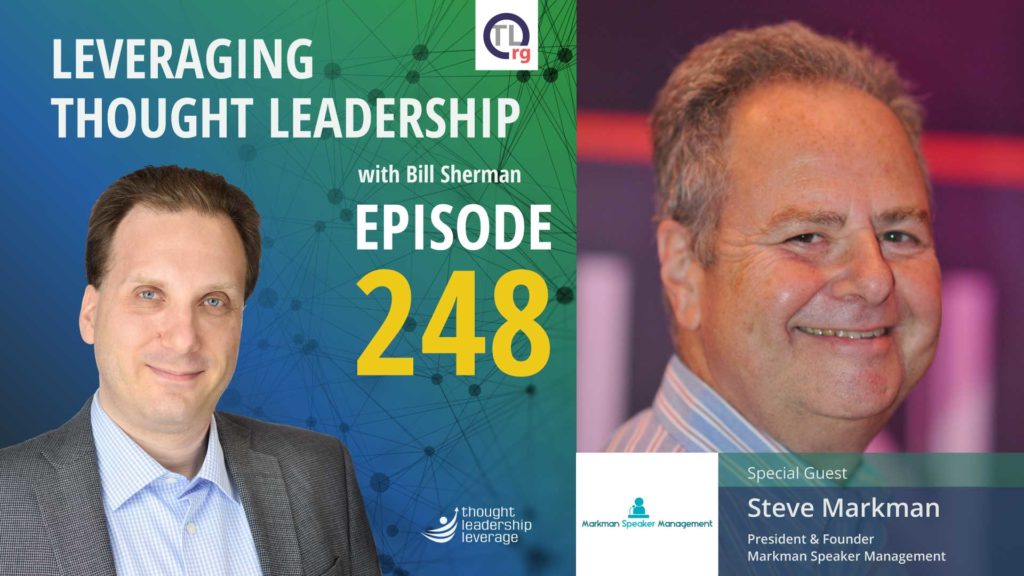
Sharing your thought leadership by speaking for free and gaining visibility.
An interview with Steve Markman about the free-speaking industry and why getting involved can pay off.
Today’s guest is Steve Markman, who headed the conference divisions for Comdex and The Conference Board before launching his own firm Markman Speaker Management in 1994. Markman Speaker Management provides executive visibility and speaker bureau services with a goal to obtain effective speaking engagements for their clients – panels, solo presentations, and keynotes.
Steve gives us some insight into the free-speaking circuit. He explains how executives and organizations can raise visibility, gain credibility, and push a thought leadership message out to large audiences. We discuss what conference organizers look for when speakers submit proposals. Also, we examine who you want your audience to be, and why COVID-19 isn’t the end of the speaking industry.
If you are a speaker waiting for COVID-19 to pass, you need to hear this episode and learn how you can get speaking from the comfort of your home.
Three Key Takeaways from the Interview:
- Why thought leaders should consider speaking for free.
- What thought leaders should absolutely avoid doing when pitching to conferences for speaking gigs.
- What thought leader speakers should be doing to be prosperous in a COVID-19 workplace.
Join the Organizational Thought Leadership Newsletter to learn more about expanding thought leadership within your organization! This monthly newsletter is full of practical information, advice, and ideas to help you reach your organization’s thought leadership goals.
And if you need help scaling organizational thought leadership, contact Thought Leadership Leverage!
Transcript
Bill Sherman Hello and welcome. You’re listening to Leveraging Thought Leadership. I’m your host, Bill Sherman. And today we’re talking about one of my passions, organizational thought leadership. That is the people who create, curate and deploy thought leadership on behalf of their organizations. My guest today is Steve Markman. Early in his career, he headed up the conference divisions for organizations such as Comdex and the Conference Board. Then in 1994, he launched his own firm, Markman Speaker Management, where he’s provided executive visibility and speaker bureau services for hundreds of Fortune 500 and professional services firms. Welcome to the podcast, Steve.
Steve Markman Thanks, Bill. Happy to be here.
Bill Sherman So let’s start at the front side of your career. You were working for organizations that were putting on large conferences and events. And I think it’s fair to say they required hundreds of speakers. And so you were constantly in search of speakers. Tell me about that process and tell me what you were looking for in terms of speaking. Give me your point of view from the conference producer’s point of view.
Steve Markman Sure. Well, so you’re right. I spent about 15 years at the front of my career doing conference development and speaker recruitment. And only when I started my own business that I switched over to speaker placement. So in terms of the development of the conference and the conference board put puts on, you know, probably hundreds of conferences a year, Comdex was the largest trade show and conference in North America of any type at its peak and got 200,000 people coming to Las Vegas, basically destroying it. Not really, but they really had miles and miles, literally 35 miles of exhibit space. So it was a huge endeavor in terms of the conferences for both Conference and Comdex and any other conference. I would say that the most important thing in terms of getting the right speakers is to be able to get people who understand that it is the content, it’s the content, stupid, right? So it doesn’t matter how good you deliver, you still have to have content and you have bad, good content and bad delivery. It depends. Sometimes, yes, that’s actually a lesser of two evils versus having great delivery and bad content. People will walk away saying, Wow, that was a great speech, but they won’t remember anything that anyone said about a week later if the if the content wasn’t good. So that’s the first lesson of a conference to do that they should always realize.
Bill Sherman So let me dig on that a little bit deeper. So if you’re the conference producer and you say content is important, how did you evaluate quality of content and how did you make those decisions from that perspective where if it wasn’t a relationship or someone you already knew as a speaker say it’s somewhat sight unseen?
Steve Markman Sure. Well, most of the speakers work for companies, right? So they were the senior V.P. or of a major Fortune 500 company talking about, say, marketing programs in their in their company or the CIO talking about how to integrate digital into their company, whatever the case may be. So they came with a certain gravitas, a certain subject matter expertise. So is there a little bit of faith that someone who has been doing something for 15 to 25 years knows what they’re talking about? Sure. Not on the delivery side, but certainly on the content side. And so they typically will have had some writings, perhaps if they’re a consultant or working for a large consulting firm, white papers and so forth, that would also add credibility to the assumption that they have certainly the content part of it, whether they could deliver that in terms of being articulate and interesting, that’s another question.
Bill Sherman So you’re relying a little bit on the logo and the title of the person, but you also said checking out their publication history. So you were looking to see have they written, have they published, had they established some thought leadership in the space before or is this their first go out? Right.
Steve Markman Exactly. That’s correct. Okay.
Bill Sherman So let’s talk about it from the organization’s perspective. And we can call them executive visibility surfaces. We can call them unpaid speaking events. But let’s talk about it as to from an organizational perspective, why is it so important? What are they trying to achieve and how do you make it work?
Steve Markman Right. So that’s a multifaceted question in terms of what are they trying to achieve. Speaking is another avenue by which people can demonstrate their thought leadership, right? So they can write books, they can do articles in publications online, and otherwise they can create white papers. They can do all sorts of printed word and of course, major bestselling books. They can do all these printed word stuff. But getting in front of 25 CEOs or 2500 people at a major conference or convention really gives them an opportunity to demonstrate this thought. Miss Ability. And why is it important? For the same reason that the other stuff is important. It’s boosting visibility. It’s demonstrating that they have the thought leadership that gives them the credibility as a potential seller of whatever service they have. Right. So what I certainly try to do and what the thought leaders in companies should do is basically be in front of those folks, the audience that mirrors the audience that. They are selling into? Are they talking to the right people? Meaning their customers, their clients or partners, anyone that that is a stakeholder in having them listen to a talk that will have some impact.
Bill Sherman So that seems and suggests that you need to be sort of really focused on who you’re trying to reach. Because if you go after large podiums versus, you know, smaller events and conferences. And so I think there’s a prestige tied to the large events that people go, that was a really big stage. Therefore, it must be the showcase of our speaking strategy. But you’re suggesting something different. Go a little bit further on that and connecting it to the audience.
Steve Markman Right. You really have to do your homework. You have to do the research to see who is in the audience. Because it could be a very large conference that gets 6 or 700 people. But if you don’t do the homework, you may not you may find out that it actually isn’t the right audience because the titles of all of those folks are too low level to have any influence on ever becoming a customer, if that’s what you want. If you want to be able to have someone to talk to that might buy your consulting services or your financial service or whatever the case may be, your consulting firm or you’re just a Fortune 500 consumer goods firm. You want to have people who you’re talking to, especially if you’re a B2B that have some buying power. So talking to, say, analysts, a roomful of analysts or young people right out of college may not be who you want to speak to. On the other hand, a college audience may be absolutely the right audience for you. If the purpose of the talk is to create some sort of message and influence. Right. So if you want to influence an audience through your thought leadership by talking about your opinions of what you think someone should do as opposed to, you know, here’s a speech number 37 on what company X, Y, Z is doing this year. If it’s something that that is societal, for example, then you may want to have as broad a spectrum in the audience as you can get from kids right out of college, all the way up to the CEO and the board of directors.
Bill Sherman So you’ve worked with a lot of organizations and you’ve talked about different objectives. You’ve talked about standing on stage to try and connect with buyers. You’ve also talked about using the podium to influence how people think and act. From your perspective as you look back? What’s that sort of mix? Is it 5050? Which one takes precedent or there are others as well as objectives?
Steve Markman Sure. I would say that most of the companies that have hired me over these 26 years since they started my business have been a combination of objectives, but it’s mostly to boost visibility as a way to generate business leads long term. So it’s not somebody isn’t going to buy a bushel of X, Y, Z that you happen to bring in right there. It may be 2 or 3 years later when someone says, well, you know what, I I’m doing a major strategy change for my company and we need someone to come in and talk about strategic maneuvers or change management or business transformation. And they I remember the speech that I heard at the Business Transformation Conference that Forbes gave. Whatever the case may be. So generating business leads, boosting visibility and by the same token, boosting brand purpose. And by the way, it could be personal brand as well as a company brand as well as thought leadership. It’s sort of lala all combined because what even if it’s just trying to influence people in the end, the truth of the matter is we all know people. The businesses are in business to sell something to make a buck, right? So while they’re doing that, if they can also talk about something that they may want to influence, that’s great. And that that’s probably was about maybe 25% of the clients that I’ve had. But most of them want to, for one reason or another, boost visibility in front of potential customers, clients and partners. And the media. Media is also very important.
Bill Sherman Because media are influencers. So if we look at it, one of the things that you mention is the sense of a time horizon that, you know, are you looking to monetize in the next quarter? Or are you looking to build a relationship over 2 or 3 years for that phone call to come in? Like you mentioned.
Bill Sherman If you are enjoying this episode of Leveraging Thought Leadership, please make sure to subscribe. If you’d like to help spread the word about the podcast, please leave a five-star review and share it with your friends. We are available on Apple Podcasts, Spotify and all major platforms as well as at LeveragingThoughtLeadership.com. Let’s talk about strategy here then. If you’re putting together a. Executive visibility program for your organization. What sort of strategy? What sort of questions should you be asking that you’re saying, okay, we’ve got this talent, we have the subject matter experts, we have people who have amazing content and story. Where do you start with strategy on something like that?
Steve Markman The first thing that I would do is get a point person, right? So this has to should be the responsibility of one person, in my opinion, in the company who is the person they could be, you know, in a number of different departments that could be in business development, they could be in marketing, PR, they might be in, you know, more and more common thought leadership department. But 1 or 2 people should be the at the limit for the person who is really undertaking this initiative so that they are able to get. All research done. They are able to work with the speaker to understand what that speaker’s subject matter expertise is and be on the same page with the Speaker as to who that speaker wants to talk to. If she or he wants to talk to the CIOs, then the point person is not going to go after marketing people. Sometimes it’s not obvious who they should talk to. Sometimes it’s a combination. Sometimes it’s very senior level people only. And then there’s another talk that may be for everybody, right? So you tailor the talk to the audience and vice versa. And that’s really important. And that’s why the paid speakers is a completely different business because speakers are in it to get paid. That’s it. Playing simple can do that in five words, the thought leadership speaking and the speaking to get visibility. That’s what I call delayed income. Right so it’s deferred or delayed income because it could be a year, two years, three years from now. It may never be any income from any one particular person in the audience, but you have created an aura of credibility and someone feeling good about that company when they leave. Just like an advertisement might do, it’s not necessarily going to have someone rush out and buy a car, but people have a good feeling about a company, and it may not necessarily be because of their product and maybe because of their philosophies.
Bill Sherman So let’s push a little bit further on that question in terms of strategy. So as you look at an organization from your experience, when you start working with folks, how many are working proactively against a strategy versus they’ve got a strategy where there’s a handful events they’ve always spoken at, they send whoever needs to go to that event and sort of plug and play that. It’s sort of like automatically repeated. Talk about that process of transformation from we speak here because we’ve always spoken here to let’s actually build this out and develop our visibility.
Steve Markman Right. So up until Covid, there were a gazillion conferences. Now there are only a half a gazillion conferences because everything has gone virtual, but there’s still a ton of speaking opportunities out there. And I bring that up only because there are so many events that sometimes, to my surprise, the clients who I work with and I’ve worked with Bank of America and PayPal and Robson Gray, big law firms, etc., consulting firms, they don’t always know where they should be speaking. They’re busy doing their job. They’re working right, so they don’t have time to go to conferences. Now you tell them that you want to speak at a conference. That’s a different story. They’re going to make time because it’s part of their job and it’s something that’s going to help the company. So what I’m basically saying, Bill, is that they usually come to me with a very short list of 2 or 3 events that they have that they know about and that have a good reputation. And then I find another 50 events that could be all anywhere in the world that they’re open to. You know, speaking in the days when people got to clients and they’re open to speaking anywhere because that is exactly what they need. They need to broaden their horizons and see what’s out there. There are a ton of really good conferences that are put on by associations, universities, nonprofit organizations and for profit conference companies, or in the business of conferences that many people don’t even know exist and they are perfectly suited, or the particular company that wants to speak.
Bill Sherman So one of the things that I think you point out nicely is there’s a constant demand for speaking that’s unpaid. And there’s a nice analogy that these are these conference producers are much like journalists. They’ve got a deadline. They’ve got to have speakers and they’ve got to put product in front of an audience. Right. And whether you’re a journalist or a conference producer, you’ve got to fill that time. You can’t just leave it be empty. So with that, how does the pitch work for unpaid speaking and for that event? And is it like a PR pitch where you’re pitching a journalist on a story? How do you make this work?
Steve Markman Right. So then the easiest way to answer that in terms of the analogy with PR is it’s sort of like PR and it’s only sort of like it because there is a pitch, but where it’s very different is it cannot be hype, it cannot be a sales pitch. That’s the death of a proposal. And basically you submit a formal proposal to the conference organizer and there it is for big, large national conferences or international conferences. There’s. Typically a call for speakers, a formal application that one has to fill out. And this is where the person who’s appointed to do this in the company, that’s part of their role, right? Because the speaker could be the CEO. He’s not going to start filling out an application. Right. So you want to have that person responsible in the company for doing that to fill it out. And it’s a whole lot of things like the bio and the abstract. You have to have a 2 or 3 paragraph.
Bill Sherman So that’s the technical side of the application. But there’s a piece there that I was thinking as well in terms of PR, one of the values from a having either a dedicated PR person or an agency is that they may and they build and maintain relationships with people. And it strikes me that there’s an opportunity as well in the speaking world for those conference producers to build relationships. Is that a fair assessment? And if so.
Steve Markman Absolutely, yes, I have just as a PR person knows, that is a good zillion editors. You know, I have a million, maybe not a million, but many, many conference producers and organizers worldwide in my contact lists and maintain relationships. Sometimes I go to them, sometimes they come to me. There’s not always a call for presenters. So a lot of times a conference organizer will call me and say, Steve, I need a speaker on such and such a topic where we’re three weeks away. I lost a good speaker. Can you help fill it? So that happens a fair amount because of the relationships that I have with conference organizers.
Bill Sherman Well, and I think that’s something that accrues year over year. Right. And so there’s value for having focused on this for a period of time. But let me ask this question. So you mentioned Covid. Okay. How has the world changed for unpaid speaking because of Covid? Where do you see it going? And if you’re looking at unpaid speaking to get your thought leadership out there, what should you be doing? What should you not be doing at this point?
Steve Markman Sure. I’ll start with the last one. What you should not be doing is sitting around waiting for Covid to go away. Besides the fact that it’s not going away tomorrow is also the fact that it’s not going to change the conference world, because what has happened is there’s been an almost total shift, at least for 2020 to virtual meetings. So in March and April, there were a whole bunch of conferences that were moved to the fall. Those fall conferences are still taking place, but they are now taking place virtual for the most part. So we’re talking about the fourth quarter conferences, October through December. And so what people in companies that want speaking engagements need to do, The executives and their support are basically the same thing that they have always been doing or should have been doing, which is to get in touch with the conference organizer, find out what the process is for submitting a proposal, whether it’s the call for speakers when it’s coming out, or if it’s just sending them an email with all the information that you need. The Speaker by the abstract, that two paragraphs, that is the goal of the industry that you have to have because you can’t just say, I’m here, I can speak, I have knowledge, you have to have a description of your talk and it’s just going to be virtual. That’s all. That’s the only difference. And are there less speaking opportunities? There are some less in numbers because there are less speakers at each conference because people don’t think that 40 speakers are going to be paid attention to virtually. On the other hand, there are more of them. So most associations are putting on more events virtually than the total number they had in person, simply because they want to stay in touch with their constituency. And that’s the best way to do it and it’s easiest way to do it, because if we are, we’re all.
Bill Sherman Well and saves the need of travel. You can attend a 1 or 2 hour event with lower time investment and commitment rather than traveling cross-country. So if you have a choice and you’re looking from the organization side, you’ve got folks who are subject matter experts who may or may not be good speakers, you have some spokes who are good speakers with less content expertise, but they’re still qualified. How do you strategically align speakers and fit who belongs where? Because not everybody’s all a square peg that can fit into a square hole. How do you sort of manage the talent side from an organization?
Steve Markman When I’m brought into a company, it’s a little bit different because they have already decided, because people have stepped up and said, I want to speak. Or someone said, Hey, we need to be out there more. And they go and they recruit within their own firm volunteers. And so they come to me and they go, we have these 3 or 4 speakers oftentimes. So it’s the CEO. It’s usually folks in senior management. I the only thing time I tell people that’s not going to work is if it’s a junior person who doesn’t have a lot of work experience, not speaking experience, but work experience because they don’t have the credibility to show that they’re subject matter expert. And that’s really more important than the delivery aspect as long as they can, the person can deliver in a in a decent way that I’m not going to hear from the conference organizer. They’re not going to hear from the conference organizer that that was terrible because the guy mumbled through the whole thing, I didn’t understand a word he said, even if it’s good content. So you need both. And I and I work with the clients. So if someone was doing it by themselves, they just need to make sure that someone is good on both accounts. You know, I would say great on content, good on delivery. So those are the two objectives that they should aim for.
Bill Sherman So I want to start wrapping up here, and I want to ask you a question. So put yourself in the role of someone inside an organization, whether they’re running communications or thought leadership for the firm. And they’re focused on getting the message out there. What chipper advice around this world of unpaid speaking might not be initially obvious to them, but is something they can take action on that will improve for their organization’s success.
Steve Markman I would say the most important thing is to really get the commitment from someone who says, Yeah, I’d love to speak because if they say they’d love to speak and then the person, the internal person starts working with them and says, Hey, Bill, you know that abstract that you were supposed to write, it’s due in three days. And then Bill says, It’s okay, I don’t have time. I’ll give it to you next week. Well, they lost that speaking opportunity because that deadline, just like as you mentioned before, editors have deadlines, conference producers have deadlines also. So got to get the commitment that they are going to do what they’re asked to do and that they really want to go out and travel once to the you know, they may write a great abstract, but then they say our clients come first and that sometimes does happen and you can’t help it. But for the most part, they should try to keep their commitments. And if they promise someone that they’re going to speak, an organization that they’re going to talk to, they should try to keep it. And then the other thing is that what I mentioned before about the sales pitch, never sales pitch. Don’t talk about how great your company is, because that will be the death of the proposal won’t even be accepted. And that’s what kills a lot of proposals.
Bill Sherman Steve, thank you very much for joining us today on the podcast.
Steve Markman You’re welcome, and thank you for having me. This was fun.


